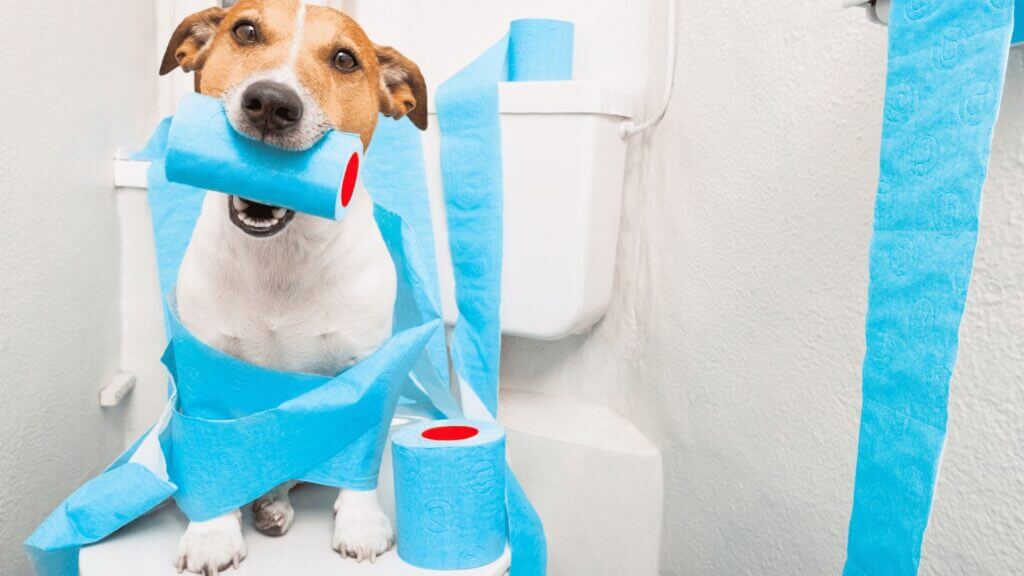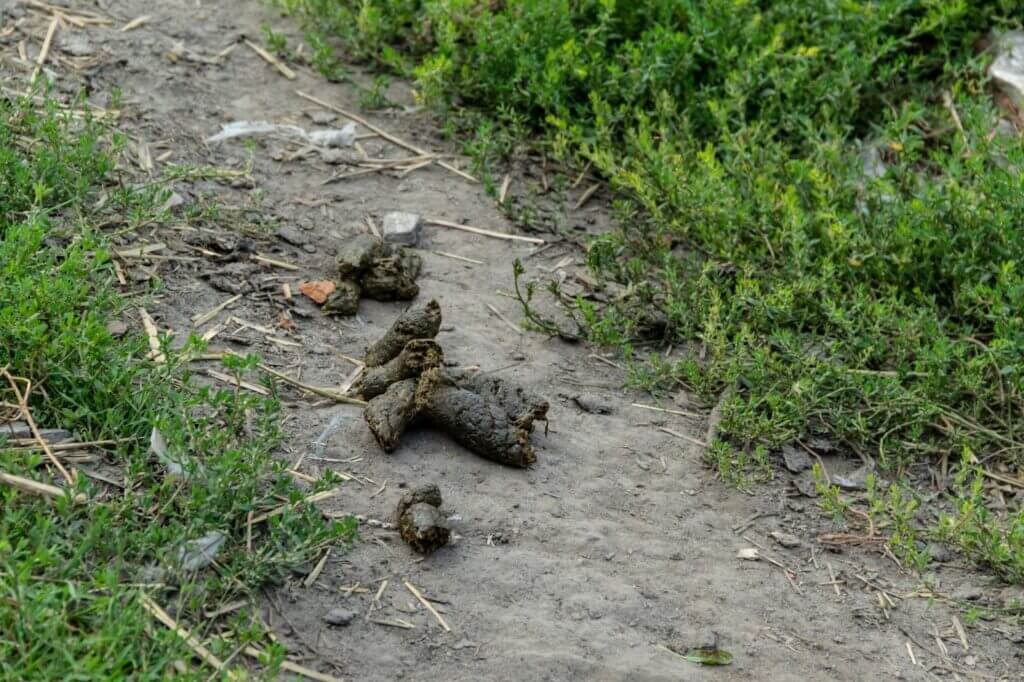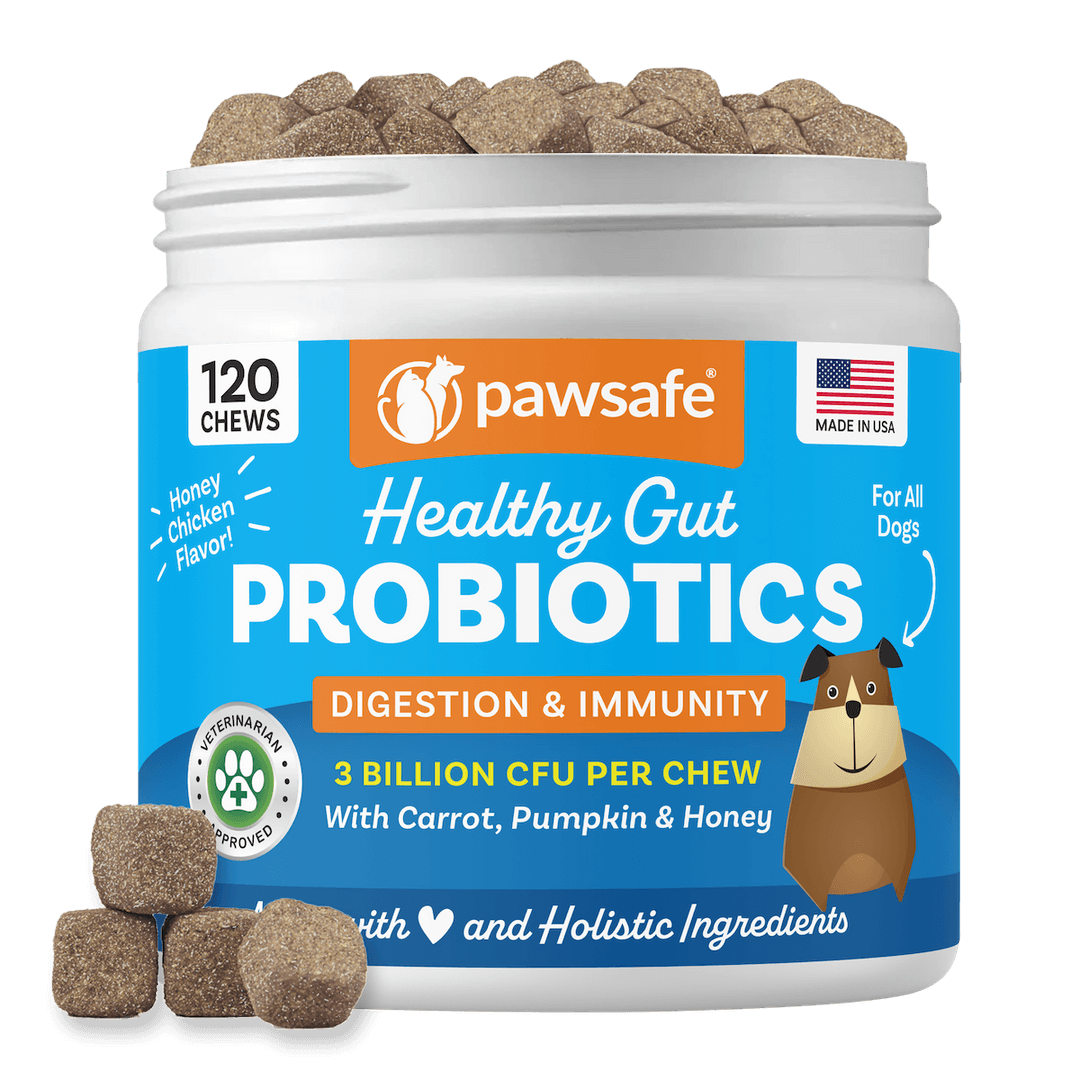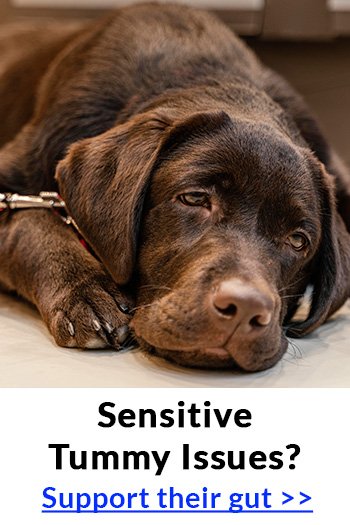
Poop color is a valuable indicator of a dog’s overall health, so it’s understandable to wonder, “why is my dog’s poop green?” Because a healthy brown is the typical dog stool color, green poop might raise some concerns.
You can make certain lifestyle changes, like changing your puppy’s diet or giving them health probiotic supplements to address tummy issues. However, many green poop cases need veterinary attention to be resolved.
Understanding why your dog’s poop is green can help you take better care of their health. By paying attention to their diet, medications, and overall well-being, you can help prevent any potential health issues and ensure your furry friend stays happy and healthy.
Table of Contents
- So, What Does Green Poop Mean in Dogs?
- 13 Causes of Green Dog Poop
- Should I Be Concerned About My Dog's Green Poop?
- Help! My Dog Has Green Diarrhea But is Acting Fine
- My Dog Has Green Diarrhea and is Vomiting
- What's Treatment For Green Diarrhea in Dogs?
- Frequently Asked Questions (FAQs)
- Final Thoughts
- References
So, What Does Green Poop Mean in Dogs?
Green poop in dogs often means your pup has eaten something inappropriate. These inappropriate items could be plenty of grass or other leafy foods like kale or dyed chews like Greenies. Other times, green dog poop can mean rodenticide poisoning, liver, pancreas, or gallbladder issues, parasites, allergies, and reactions to certain medications.
13 Causes of Green Dog Poop

Most pet owners have encountered green poop, some even coming across it severally. While it’s arguably less scary than changes like a bloody stool or green pee, it warrants some questions and your attention.
Various factors, including dietary, health-related, and parasitic causes, can cause green dog poop. These 11 causes of green dog poop will help you understand the issue better and know what step to take next.
1. Your Pup Ate Too Much Grass
Dogs are far from grazers, but they do like their grass. If your dog is eating too much grass, it can cause digestive upset and is one of the most significant causes of green poop. You will almost always see some grass blades in the poop if eating grass is the cause.
Several expert sources[1] show that dogs eat grass to alleviate nausea or induce vomiting if they don’t feel too good. However, the same studies show that grass eating may be an inherited trait in canines, not necessarily always pointing to gastrointestinal issues.
Therefore, it’s best to watch your dog’s diet to determine what would cause them nausea and discomfort, driving them to eat grass.
2. Too Many Greens (or Greenies) in the Diet

We want the best for our canines, so knowing they’re omnivores, it only makes sense to give them veggies. While upping plant vitamin uptake is essential for dogs with greens like kale, it can also cause their stool to change to green due to chlorophyll.
The popular dog dental chew, Greenies, is also known to give dog’s green poop from the green dye. Consider adding a dental mouth rinse to your dog’s water for mouth hygiene instead.
When the dog poop is firm and normal looking, with no other signs of illness like diarrhea or vomiting, (or blood and slime on the poop), then it is more likely something green your dog ate then a medical problem.
3. Poisoning
**Some kinds of poisons, particularly rat poison or rodenticide can cause green or blue dog poo. This is mostly the poisons that contain warfarin or bromethalin. **You may see signs like coughing in addition to green poo, and if you sadly had a dog that had green poop and died, you may want to rule out poisoning,
Rat poison in dogs is a medical emergency and you need to act fast to get your dog to the vet. The video below shows what a dog struggling with rat poison looks like:
4. Dietary Intolerance and Food Sensitivity
Certain ingredients in a diet can react with your dog’s body, causing stool color to change to green. Usually, bile added to food is reabsorbed into the intestines,but that which remains in the guts breaks down and turns digested food brown. However, maldigestion or malabsorption can mean that the food moves through the gut too fast for the bile to turn brown.
This can lead to green or even yellow poop.
Additionally, If your dog eats too much, it can cause green poop. Overeating can lead to diarrhea, which can cause the food to move too quickly through the digestive tract, sometimes resulting in green poop.

Daily Support For Healthy Digestion
Multi-strain probiotic soft chews that help maintain gut balance and stool quality in an easy, tasty format.
Shop Now 👉Vet Approved Formula • 90-Day PawSafe® Promise
5. Pesky Parasites in the Intestines (Giardia)
Parasites can also cause green dog poop. Intestinal parasites, such as giardia or worms, can cause the poop to appear green. Giardia infections are a major cause of slimy, green dogs that are also usually runny (diarrhea).
The signs of a parasite causing green poop in dogs can vary depending on the type of parasite. Some common signs include diarrhea, vomiting, weight loss, lack of appetite, and white specks in the poop.
Green Poop in Dogs Due to Giardia infections
Giardia is the most common parasite causing canine green diarrhea, so it gets its own section. Giardia is a microscopic parasite found in contaminated water sources, such as streams, ponds, and lakes. A study[2] showed that Giardia had a prevalence rate of 15.2% in dogs and is more common in younger dogs.
Sometimes giardia dog poop is yellow or even brown, but it’s always liquid poop. Slime or mucus on the poop usually means the intestinal lining is shedding because it’s aggravated by the infection. This can lead to inflammation, which can also cause blood in the poop when it comes to giardia infections.
Dogs can become infected with Giardia by drinking contaminated water or by coming into contact with infected feces. Symptoms of Giardia can include diarrhea, vomiting, and weight loss. Sometimes giardia dog poop is yellow or even brown, but it’s always liquid poop. Slime or mucus on the poop usually means the intestinal lining is shedding because it’s aggravated by the infection. This can lead to inflammation, which can also cause bloody diarrhea when it comes to giardia infections.
6. Food Coloring and Dyes In Stuff Your Dog Eats
Another possible cause of green dog poop is food coloring. Some dog foods and treats contain artificial colors, which can cause the poop to turn green. Purple and blue dyes in foods, such as those in red cabbage, can cause green dog poop.
If you suspect that your dog’s food is the cause of the green poop, try switching to a different brand or type of food to see if the problem resolves itself.
7. Bacterial or Viral Infections
A bacterial infection can also cause green poop in dogs. Gastroenteritis[3], an infection of the intestinal tract, can cause green poop and other symptoms such as vomiting and diarrhea. In severe cases, it can lead to bloody poop or bloody diarrhea, which can be a medical emergency.
8. Liver Issues
When the liver is not functioning correctly, it can disrupt the production or flow of bile. Liver issues[4] interfere with the normal metabolism and excretion of bile, resulting in a buildup of bilirubin in the body.
Usually, bilirubin gives bile its characteristic yellowish-green color. However, when there is an excess of bilirubin, it can pass through the digestive system, resulting in greenish-colored poop.
9. Gallbladder Problems
Problems with the gallbladder[5], such as gallstones or inflammation, can interfere with the normal release of bile. This disruption can result in insufficient amounts of bile reaching the small intestine during the digestive process.
Bile contains pigments that give stool its brown color. When there is a reduced bile flow or a lack of bile reaching the small intestine, the poo may not undergo the typical color change and can appear green.
10. Pancreas Issues
Another possibility for green poo is pancreatitis or other pancreas issues. A major one is pancreatic enzyme insufficiency, which leads to greasy, stinky stools that can be green or other colors including yellow, gray or white poop. Pancreas problems are usually extremely serious and need immediate veterinary attention.

Gut & Immune Support In One Chew
Targeted strains assist normal digestion while supporting natural immune defenses—simple once-a-day routine.
Shop Now 👉Vet Approved Formula • 90-Day PawSafe® Promise
11. Stress and Anxiety Can Change Your Dog’s Poo
Dogs experiencing stress or anxiety may have bowel movement changes, including stool color variations. You can conclude that stress is the reason behind the color if your dog has undergone a stressful event or experiences general anxiety.
12. Intestinal Issues
Intestinal issues like colitis can affect your dog’s poop color since they affect the normal digestive process. Crohn’s is another common disorder that could cause unusual color changes in your dog’s stool.
IBS (Irritable Bowel Syndrome) is a GI disorder that can also cause stool change. IBD (Inflammatory Bowel Disorder), an autoimmune disease commonly confused with IBS, can also be a culprit.
13. Some Medications
Some medications or supplements can alter the color of your dog’s poop. If your dog is on any medications, it’s worth checking the potential side effects. Certain dietary supplements, particularly those containing high iron levels, can cause the stool to appear green.
Strong antibiotics can kill off large parts of your dog’s brown-staining bacteria, causing the green color. If you suspect a correlation between medication/supplement use and the green poop, consult your veterinarian for guidance. Consider adding quality probiotics to support digestive health and restore healthy gut bacteria.
Should I Be Concerned About My Dog’s Green Poop?
You should be concerned about your dog’s green poop if it is consistently green, accompanied by other symptoms such as vomiting or diarrhea, or if it lasts more than a day or two. If you are concerned about your dog’s green poop, it is always best to consult your vet to determine the underlying cause and the best course of treatment.
Green poop is not necessarily normal for dogs but is not always a cause for concern. If your dog has a one-time episode of green poop, it may be due to something they ate or a minor digestive issue. However, if your dog’s poop is consistently green, it may indicate an underlying health problem.
Help! My Dog Has Green Diarrhea But is Acting Fine
If your dog has green diarrhea but is otherwise okay, they may have munched on too much grass when outside. Chlorophyll in plants often causes green stool in canines and is typically harmless, which is why your dog is acting perfectly fine. This also applies to other greens you give them yourself in their diet.
Green poop without other signs can also suggest your dog has intestinal parasites in the early infestation stage. However, be sure to watch your dog’s other behaviors.
Your dog may fail to show physical signs like vomiting but has behavioral symptoms like withdrawal and fearful behavior. In this case, your dog’s green diarrhea may be stress-related, explaining why they’re acting relatively “normal.”
My Dog Has Green Diarrhea and is Vomiting
Green diarrhea plus vomiting often means your dog is reacting to something in their diet or they are in danger from potential poisoning, or disease like exocrine pancreatic insufficiency (EPI).
Eating something bad as a cause of green diarrhea typically resolves quickly (24 to 48 hours) once the body corrects itself (but you need to watch for dehydration). However, it’s best to treat green diarrhea as an emergency and see a vet to rule out life-threatening conditions like poisoning or pancreatitis.
Chronic green poop and diarrhea can also indicate serious issues like liver and gallbladder problems. These conditions need prompt veterinary attention before they escalate.

Make Digestive Care Effortless
Palatable soft chews your dog looks forward to, helping keep things regular and comfortable over time.
Shop Now 👉Vet Approved Formula • 90-Day PawSafe® Promise
What’s Treatment For Green Diarrhea in Dogs?
The treatment for green poop in dogs will depend on the underlying cause. If a dietary issue causes your dog’s green poop, you may need to adjust their diet or give them digestive enzymes, but most times, only a vet visit will suffice.
- Go to the vet for them to perform a physical examination and run tests to identify the underlying cause of green poop. This is vital to rule out anything life threatening.
- Watch your dog’s diet. Introduce new foods slowly to your dog. Additionally, try to limit green foods like kale and broccoli in their diet if you notice greenish stool.
- Address any chronic tummy issues like IBS.
- Limit your dog’s access to food that’s dyed.
- Deworm your dog regularly.
- Provide a calm, stress-free environment for your dog.
Frequently Asked Questions (FAQs)
Why Does My Dog Have Green Poop After Taking Chicken and Rice?
Green poop after chicken and rice can indicate food sensitivity or allergies, possibly since chicken is a common food allergy. However, the combination is a go-to meal for pups already with stomach issues to help settle their stomach. This means that the green poop might not result from the chicken and rice but from whatever caused stomach discomfort prior.
What Parasite Causes Green Poop in Dogs?
Giardia is the most common parasitic infestation causing green diarrhea in dogs. Other parasites like coccidia may also cause green hues in stool in dogs. Stools affected by parasites also often have red streaks of blood.
Why is My Dog’s Poop Green After Changing Diet?
Diet change often causes poop color and consistency changes as your dog’s system gets accustomed. Green diarrhea after a new diet means your dog is sensitive to an ingredient in the food. The poop color change can result from too many greens if you give your dog more plant vitamins.
Final Thoughts
Various factors, including diet, medication, infection, and food sensitivity, can cause green poop in dogs. Some medicines, parasites, and liver or gallbladder issues can also cause changes in stool color. Therefore, it’s essential to monitor your dog’s poop and seek veterinary attention if you notice any changes in color or consistency.
References
- (PDF) Why do dogs and cats eat grass?. Researchgate. https://www.researchgate.net/publication/288656215_Why_do_dogs_and_cats_eat_grass
- The prevalence of Giardia infection in dogs and cats, a systematic review and meta-analysis of pr.... PMC. http://pubmed.ncbi.nlm.nih.gov/25583357/
- A retrospective study of the prevalence of gastroenteritis in dogs attending some veterinary clin.... ScienceDirect. https://www.sciencedirect.com/science/article/abs/pii/S221456722100065X
- Gastrointestinal, Pancreatic, and Hepatic Disorders. PMC. http://ncbi.nlm.nih.gov/pmc/articles/PMC7149352/
- Chronic Cholecystitis of Dogs: Clinicopathologic Features and Relationship with Liver. PMC. http://ncbi.nlm.nih.gov/pmc/articles/PMC8614729/







